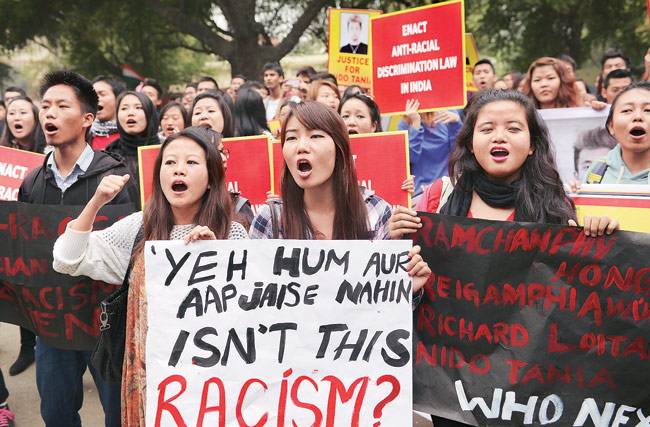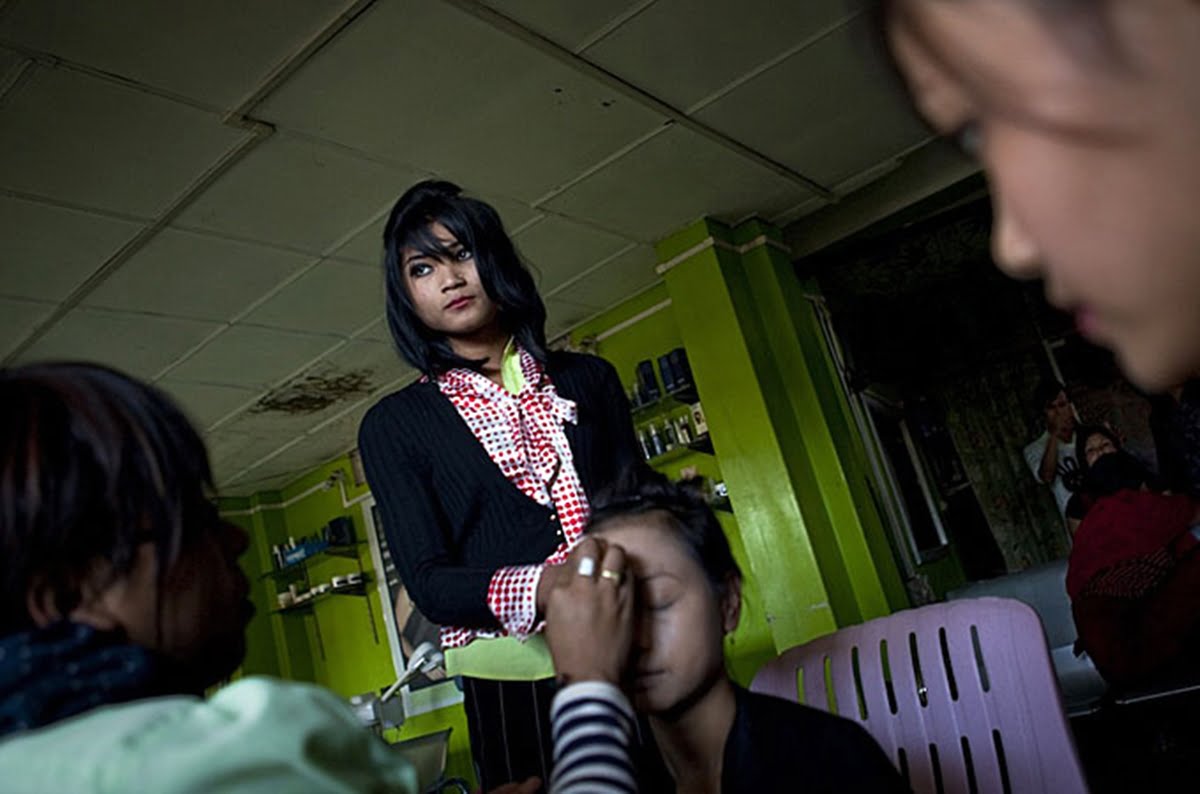The face of the COVID-19 pandemic and the subsequent lockdowns are the young male migrants, usually in the age group of 20 to 35 years, scrambling back home on buses, trains or foot. For migrants, now in their homes, it either means to start afresh in their villages or eventually return to work in urban centres. However, for one category of people, this disaster is taking an even heavier toll with ever shrinking alternatives. These are the rural girls and women migrants from North-East region who are engaged in service sectors in bigger cities across the country. These women, who have struggled against all odds to move out of their villages and break into the industry are now staring not just at the loss of livelihoods but also safe spaces away from their homes.
Women migrants from North-East India, who have struggled against all odds to move out of their villages and break into the industry are now staring not just at the loss of livelihoods but also safe spaces away from their homes.
Also read: Covid-19 And Multiple Racist Attacks Against North-East Indians
It has never been easy for women migrants from North-East part of India to work and settle in “mainland” India. I should know- as a Kuki tribal girl from the Haflong hills of Assam, my five-year stint outside the North-East felt like a trial by fire at times; in retrospection those challenges seem both trivial and overwhelming at the same time. The frustration of finding a decent place to live without being harangued, that partying was not allowed because of the general labelling of women migrants from North-East region with features like us as “easy going” and “characterless”, the casual name-calling such as “Chinki”, for starters, now seem just as ludicrous as worthy of one’s rightful inner anger.
I do come from a certain position of privilege because of my education and the support of my middle-class household which can shield me during times of emergency. But for women migrants from North-East region who work in hotels, restaurants, beauty parlours, spas, hospitals, malls and host of other industries in between what is formal and informal work, the COVID-19 phase is a perilous time. Even in any ordinary day, women migrants from North-East region have to constantly fight battles in hostile cities to stay and work outside their home states. And COVID-19 has brought along extraordinary situations. Little has been documented on the ways in which these women migrants from North-East region are coping with the distress of the current period.
I conducted a telephonic interview with twenty of such women migrants from North-East region, in the age group of 20 to 35 years, over the course of a week. The respondents were from different North Eastern states of Assam, Manipur, Mizoram and Nagaland. All names in this narrative have been changed to protect identity. This interaction sheds some light on the plight of these women migrants from North-East region in the service sector.
Fading Hopes In Hotel Industry
When the lockdown was announced, Sophie from Mizoram wanted to return home but could not find space in an overcrowded train. She works in a three-star hotel in Ernakulam district of Kerala. Unfortunately for her, she caught the virus and eventually landed up in a quarantine centre. She has recovered now. The hotel has closed but she is staying put in Kerala hoping that the industry will soon pick up.
Sophie’s friend from Mizoram, Paulie, works in the same district. She has not visited home in three years now. “It takes at least two-three weeks’ time for one home visit. We do not get that kind of leave. Most of us have to quit our jobs whenever we decide to come home. Then come back again to search for new jobs.” Paulie was asked to quit by her employer when the lockdown was announced; she has finally managed to reach Mizoram.
Rita is from a village in western Assam and works as a receptionist in a hotel in Udaipur. She hasn’t received her salary since the lockdown started and will not be paid until the hotel starts functioning again. For the time being, she has a roof over her head and has been provided with food by the hotel establishment. Most of her colleagues and friends, all from low income families, who were from nearby towns, have left. They might never come back. For women migrants from North-East region like Rita, the pandemic has slowly eroded their carefully crafted social security and peer support system, in an unfavourable external environment, making them vulnerable and alone.
No Option of Going Home:
Many of these women migrants from North-East region against their families to seek employment far away from home. Ruth from Nagaland, who is now in Delhi and works as a waiter in a high end restaurant, says, “I don’t want to go home. If I go now, I might not be able to come back ever. I have extinguished my savings, I can’t even ask money from my family as they were adamant that I do not work in a city. Girls are not supposed to come this far alone.”
Some of these women migrants from North-East region that I spoke to have been hiding their occupation from their families. Working in a spa or a parlour is perceived as demeaning. Anju from Nalbari district of Assam, who works in Pondicherry says, “I always wanted to live and work in a city. I told my family that I work in a mall. All hell will break loose if they come to know that I work in a spa. I am an independent woman now and don’t want to go back.” Anju is desperately waiting for the spa to reopen.
Eli, a recent arrival from Mizoram, worked at a beauty parlour in Pune. She left home because of the relentless pressure to get married. Even though she has lost her job, she is staying with a friend from Nagaland and does not want to come back. But Eli is running out of options. Like Eli, new women migrants from North-East region to the cities have been caught completely unaware by the current pandemic and the subsequent lockdown.
Attacked For Being “Chinese”
Sheena from the Senapati district of Manipur is one of the women migrants from North-East region who have been living in Bangalore for almost 10 years now. She shares that when the lockdown was announced and the news of so called “Chinese virus” started spreading, her landlord asked her to vacate her rented house. On asking the reason, the landlord replied, “You look like Chinese and we don’t know how many people you meet when you go outside, so I cannot take the risk of letting you stay here”. She works in a mall and hasn’t received salary since the lockdown. She has vacated her room and stays with a friend. Despite everything, she doesn’t want to return home. “What will I do at home? At least I work here and get money every month. I hope the mall opens soon.”

Moi from Nagaland has lost her job in a catering service in Chennai. She has also been subjected to extreme racial abuse in the past few months. “When I go outside to buy vegetables, people cover their nose and mouth as soon as they see me. Everyone thinks I am Chinese and somehow I am responsible for the spread of the virus”.
A majority of these women migrants from North-East region do not want to return to their native places for the fear that they would not be able to come back to their workplaces if the situation improves. Moreover when the spas or hotels open, given the state of the economy, limited opportunities will be up for grabs.
Also read: A Racist India & How Its Racism Is Different For North-Eastern Women
Each of these interviewed women migrants from North-East region, now living across different cities in India, had similar tales. The sense of dread and uncertainty was palpable in them. They are living under constant uncertainty of losing their jobs permanently since the lockdown. Some of them have already been shown the door. However, a majority of these women migrants from North-East region do not want to return to their native places for the fear that they would not be able to come back to their workplaces if the situation improves. Moreover when the spas or hotels open, given the state of the economy, limited opportunities will be up for grabs. Someone else might take their place. That would mean they will lose their livelihoods and financial independence forever. And with that, their hard earned freedom.
Carolyn Changsan is a development professional who works with women from poor and marginalized groups in rural NE India. She is associated with Seven Sisters Development Assistance ( SeSTA ), one of the largest grassroots agencies in the region. Her focus areas are economic empowerment and gender equality. She is based out of the Barkhetri block of Nalbari district in Assam. She can be found on Twitter, Facebook and Instagram.
Featured Image Source: Al Jazeera





Covid 19 is the planned pandemic Tricks of
Tedrose+ Bill gates+ CCP/ Evil, Co; WHO only•••